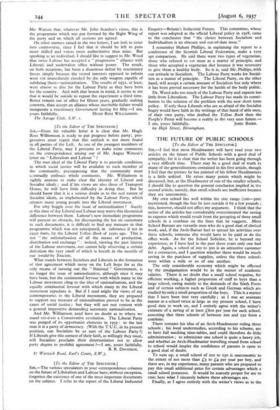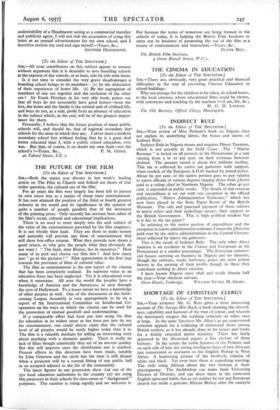THE FUTURE OF PUBLIC SCHOOLS
[To the Editor of THE SPECTATOR.]
SIR,—I feel that most Headmasters will have read your two articles on the future of Public Schools with a good deal of sympathy, for it is clear that the writer has been going through a very difficult time. There may be a good deal of truth in many of the generalisations contained in his first article, though I feel that the picture he has painted of his fellow Headmasters is a little unkind. He raises many points which might be discussed, but, as the Headmaster of one of the smaller schools, I should like to question the general conclusion implied in the second article, namely, that small schools are inefficient because they are uneconomic.
My own school lies well within the size. range (roo-3oo) mentioned, though the fees lie just outside it by a few pounds ; this, however, should not affect my argument. I think that the writer of the articles has considerably overestimated the saving in expense which would result from the grouping of three small schools in a combine on the lines that he suggests.. Most School Bursars are versatile men who do a good deal of clerical work, and, if the Arch-Bursar had to spread his activities over three schools, someone else would have to be paid to do the office work. As for the School Solicitor, he is beyond my experience, as I have had in the past three years only one bad debt. Again, a school of 200 to 300 is an attractive customer for a contractor, and I question whether there would be much saving in the purchase of supplies, unless the three schools were within a mile or so of one another.
The only considerable economy which might be effected by the amalgamation would be in the matter of academic salaries. There is no doubt that a small school requires, for efficient working, a higher proportion of staff to boys than a large school, owing mainly to the demands of the Sixth Form and of certain subjects such as Greek and German which are studied by only a small proportion of the boys. This is a matter that I have been into very carefully ; as I was an assistant master at a school twice as large as my present school, I have good data to work on, and I entirely agree with the writer's estimate of a saving of at least k60o per year for each school, assuming that three schools of between 200 and 25o form a combine.
There remains his idea of an Arch-Headmaster ruling three schools ; his local understudies, according to his scheme, are to have full teaching time-tables, and could therefore do little administration ; to administer one school is quite a heavy job, and whether an Arch-Headmaster travelling round from school to school would inspire the confidence of parents is open to a good deal of doubt.
To sum up, a small school of 200 to 250 is uneconomic to the extent of not more than £3 to £4 per year per boy, and there are, in my experience, many parents who are prepared to pay this small additional price for certain advantages which a small school possesses. It would be scarcely proper for me to state here what I sincerely believe these advantages are.
Finally, as I agree entirely with the writer's views as to the
undesirability of a Headmaster acting as a commercial traveller and publicity agent, I will not risk the accusation of using this letter as an unpaid advertisement for my own school, and I therefore enclose my card and sign myself.—Yours, &c.,
ANOTHER HEADMASTER.







































 Previous page
Previous page